SOE welcomes new staff member
Joanna Mills is the new certification specialist for Graduate Student Education. Her responsibilities include tracking the progress of graduate teacher candidates enrolled in certification programs, sending out admissions materials, and helping keep the Certification Office in compliance with federal and state regulations. After graduating from the University of Hawai’i at Manoa, Joanna spent some time with family in North Carolina before driving to Washington state in January of 2019. She currently commutes from North Beacon Hill and is a big fan of public transportation.
Our friends from Ballard High School
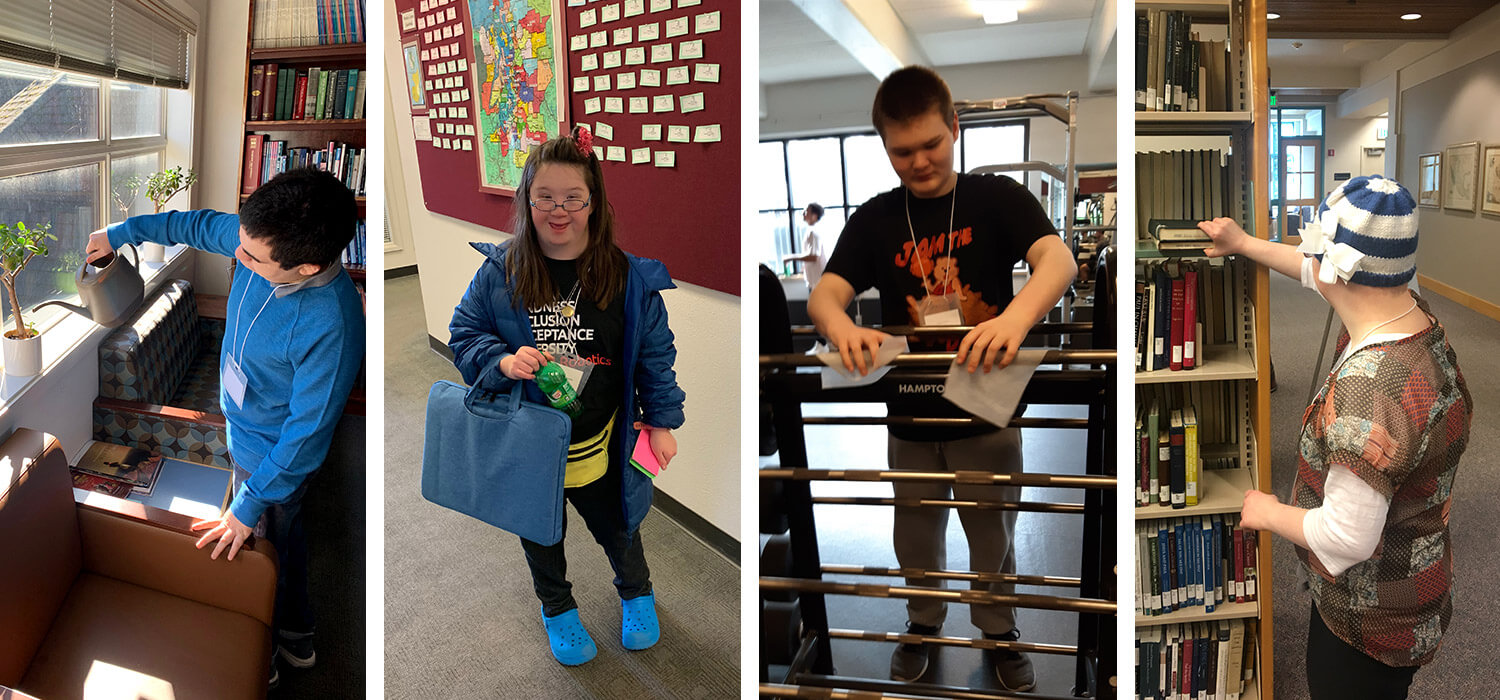
Robyn Maddess teaches special education, working with students in a Focus Program classroom setting. Robyn can be found Monday through Friday at Ballard High School, preparing materials for her classes, leading individualized education program (IEP) meetings and discussions with paraeducators, and collaborating with general education teachers.
Since 2016, the School of Education has provided work-related experience for students in Robyn’s classes. Twice each week, Robyn brings students from Ballard High School to SPU. Upon arrival, the students split into groups, working in the Ames Library, the Royal Brougham Gym, and the SOE.
The objective of this partnership is to support Robyn’s students with increased social interactions, generalizing skills learned in the classroom and applying these skills to work-related settings.
The faculty and staff of the SOE have connected with and embraced the students from Ballard High School. They have also provided the students with such tasks as:
- Making copies
- Scanning documents and sending the documents by email to faculty and staff
- Data input
- Organizing classrooms in the SOE
- Sorting papers, mail, and journals
- Watering plants
- Restocking copiers with paper
- Sterilizing door handles (especially during flu season)
- Shredding and recycling shredded papers
- Sweeping and maintaining the balcony of the SOE
The faculty and staff of the SOE have enjoyed getting to know this uniquely wonderful group of students. Staff member Jason Thornberry has played an essential role facilitating this relationship and fostering an inclusive setting.
In March 2019, Jason Thornberry and Associate Professor of Education Jorge Preciado were guests of honor at a dinner prepared by the Ballard High School students on their home turf. The pair enjoyed a delicious meal of gazpacho soup, salad with raspberry vinaigrette, and dessert. They were impressed by the skill and the sincerity that could produce such a wonderful dining experience — in a high school, no less. And they had yet another reason to be thankful for what has become a rewarding partnership.
Q&A SOE faculty: Jorge Preciado
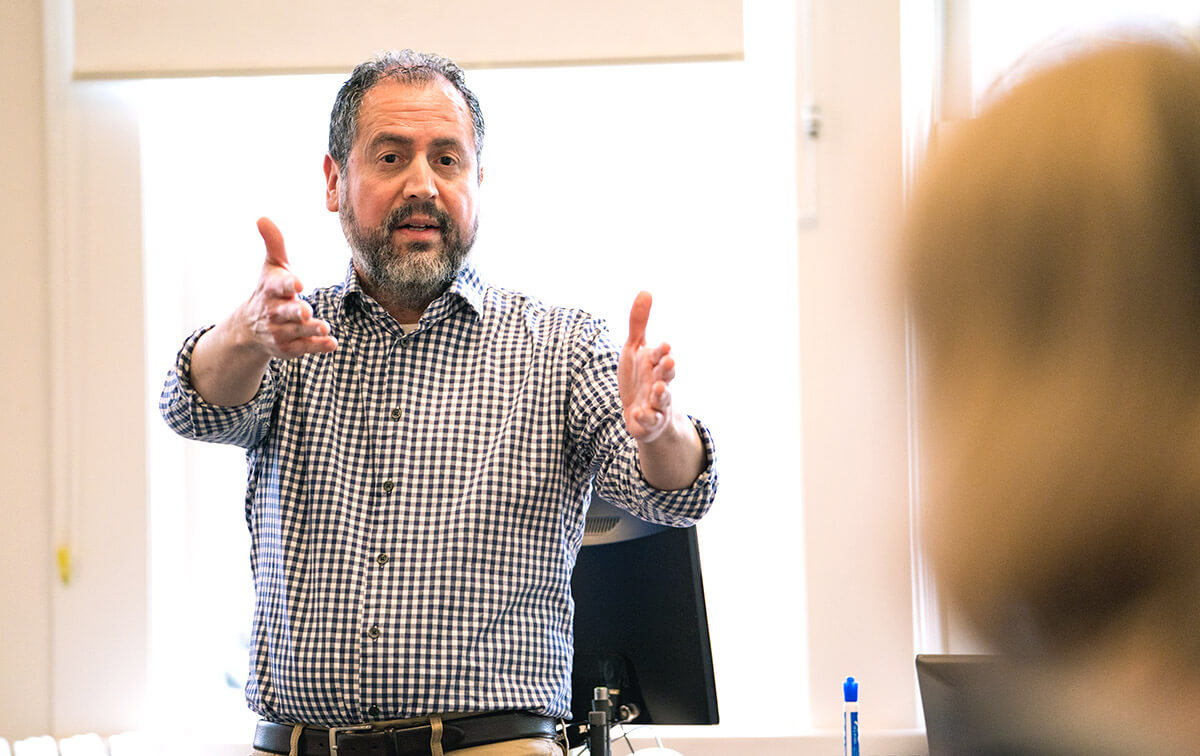
Who is Jorge Preciado at SPU and outside of SPU?
My name is Jorge Preciado and I was born in Tijuana, Baja California, Mexico. I have been at Seattle Pacific University since 2010. I currently teach graduate and undergraduate courses in special education, literacy, and multicultural education.
I enjoy working at SPU because I can have direct contact with students who are transforming education and/or are on the verge of becoming important members within school settings. SPU provides me with opportunities to grow professionally through professional development (as a participant and/or presenter), encourages and supports collaborations and interactions with colleagues and students, and values scholarship work.
Teaching multicultural education courses has provided me with opportunities to grow professionally and to better inform my students when teaching students from diverse backgrounds. Within the context of multicultural education, I enjoy bringing components of special education since the more general education teachers understand special education the better the collaboration between general and special education teachers.
When I am outside of SPU, I enjoy spending time with my family, being thankful for my faith, and walking. Like many families, day-to-day activities consume much of our day, however, maximizing time to spend with family is important. As a family, we enjoy eating meals together so that we can share and discuss school, work, and/or other topics. Additionally, we like to watch a good or funny movie together from the comfort of our couch. I would say that being a husband and a parent have taught me many wonderful lessons and I appreciate what I have learned from my wife and our three children.
I have always been grateful about my faith and I feel that God provides many opportunities for growth. Supporting the needs of my students and helping them reach their goals brings a lot of satisfaction. I know that God has brought many wonderful people into my life who have helped me reach professional goals and/or helped me to become a better Christian. It is comforting that SPU values the blend of Christianity and forming students to take on complex issues within society.
Last, I enjoy walking with my wife because we get to talk and debrief about our day. Our walk is a good opportunity to listen, share thoughts, laugh, and/or pray for others. Additionally, we can increase our steps!
How did you get involved in special education?
I got involved in special education because I wanted to work with students in K–6 settings who had a difficult time learning and/or demonstrated challenging behaviors. I worked 13 years as a classroom teacher, with the last four years as a special education teacher. During my time as a classroom teacher, I enjoyed the interactions with my students, however, at times I felt as if I could do more. I was fortunate enough to enroll in a master’s program for general education teachers with a special education focus. The program enhanced my skills working with students who required more academic and/or behavioral support. These new skills energized and motivated me to pursue a doctorate in special education and to focus my scholarship on students who require more intensive literacy and behavioral supports in K–6 settings.
What is one project you are currently working on that you are excited for others to know about?
I can talk at length about this question, but I will stay brief. First, I want to thank Dr. Eigenbrood, Jennifer Norton MS, and Dr. Jalalian-Chursky as they contribute greatly to the nucleus of our team. I am excited that I get to work with people who are thoughtful, caring, and professional. Additionally, each of them brings vast knowledge in many different aspects of special education, which makes our program stronger and provides our undergraduate and graduate students with the tools to succeed in P–12 settings. One project that I am currently working is collaborating on a manuscript with my aforementioned colleagues on best practices to support the academic and behavioral needs of Latino students in K–6 settings. Our goal is to address evidence-based practices to better support K–6 teachers when working with Latino students.
What can you tell educational stakeholders about special ed and/or to make them want to pursue special education?
At SPU we value our students’ experiences in the classroom and outside of the classroom setting. Therefore, our special education pre-service teachers are given multiple tasks and opportunities to learn from professionals in the workplace. We currently have partnerships with Coe Elementary, Ballard High School, Families for Effective Autism Treatment, and the Experimental Education Unit at the UW. As stated, giving our pre-service teachers opportunities to generalize skills in P–12 settings has been a valuable experience. We are very grateful for the teachers, support staffs, and administrators who have collaborated with us. I would say that we value our students and we provide opportunities for our students to make an impact in the lives of students with disabilities!
10 things you should know about … Digital Education Leadership
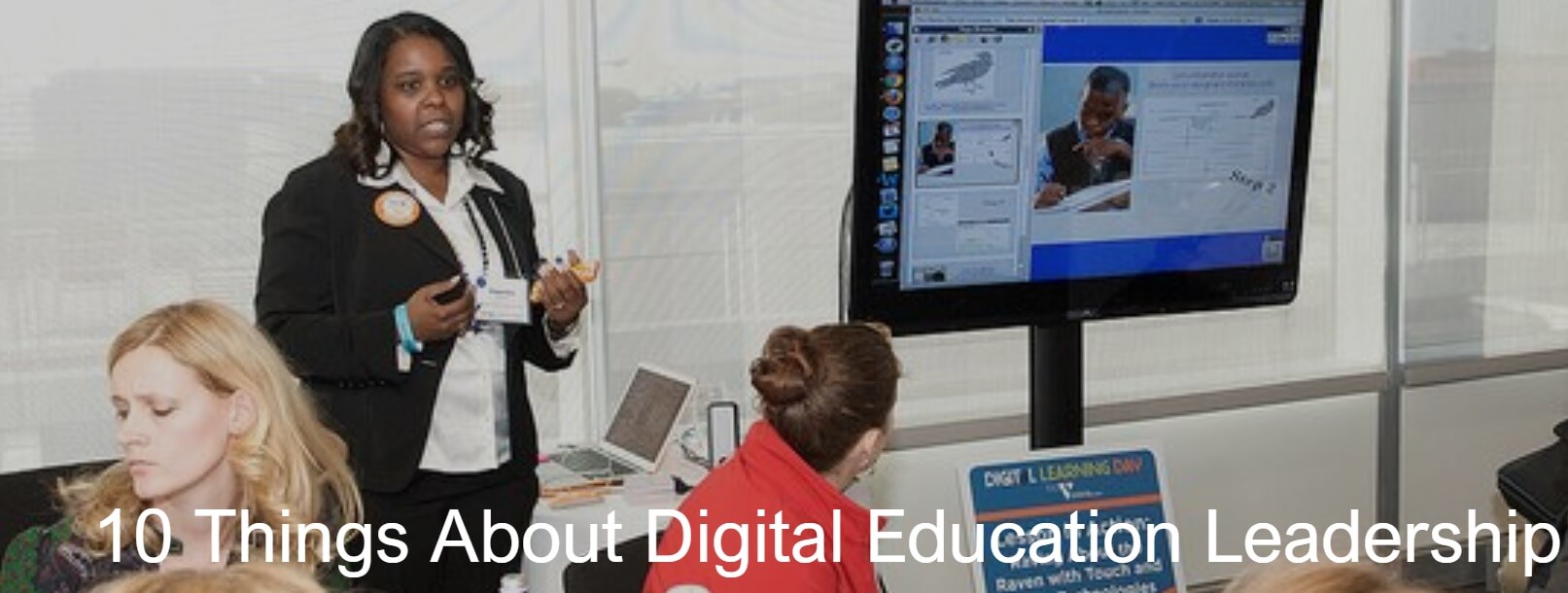
Dr. David Wicks has graciously put together
an amazing presentation about Digital Education Leadership. Click here to examine digital education leadership using the International Society for Technology in Education (ISTE) Standards for Coaches.
Alumni highlights
Kedmon Mapana
Growing up in Chamwino, Tanzania, Kedmon Mapana was fascinated with the musical traditions of his cultural group, the Wagogo. Kedmon’s enculturation into Wagogo musical traditions happened by watching his father drum, dance, and sing. In school, however, he learned nothing about Wagogo music. Rather, he studied Western music, a colonial holdover.
At some point during his education, Kedmon began to wonder about the discontinuity of Tanzanian children learning Western music at school, while at home and at church they learned the musical traditions of their culture. The disjuncture of learning Western music in school rather than the music they grew up with was concerning. Additionally, Kedmon was concerned that the absence of traditional music in the school curriculum would have a negative impact on the long-term viability of the cultural traditions of the Wagogo people.
Kedmon’s questions and concerns eventually led him to pursue graduate studies in music education and performing arts at the University of Dar es Salaam. When a prominent ethnomusicologist from the University of Washington visited the University of Dar es Salaam, she was introduced to Kedmon. Recognizing Kedmon’s talent and desire to learn more about the importance of cultural traditions in education, she suggested he continue his studies in the United States.
While at SPU, Kedmon researched and wrote on the importance of enculturation and informal learning. His dissertation research, under Bill Nagy’s guidance, showed that “Tanzanian music educators strongly support enculturation continuity (music teaching and learning that is linked to the music of the student’s culture) starting with local ngoma, then national and global music.” Kedmon found that in order to internalize one’s cultural traditions, it is important that the study of music be linked to the traditions of a student’s culture.
Since graduating from Seattle Pacific University in 2013 with a PhD in Education, alumnus Kedmon Mapana has been teaching at the University of Dar es Salaam in the Department of Creative Arts. After graduation, Kedmon has been awarded the President’s Citation Award. Recently, he was promoted to senior lecturer and head of the Department of Creative Arts at the university.
While Kedmon continues to research, teach, and write, in his “spare time” he oversees the Wagogo Music Festival. The purpose of this annual festival is to introduce, promote, and preserve the teaching of cultural arts in all educational institutions. Kedmon asserts that “once culture is taught in schools; it will be an opportunity to share this with the world.”
Read more of Kedmon's story in SPU Voices.
Kimberly Oakley
Kimberly Oakley has been an elementary teacher for nine years in California, Washington, and internationally; teaching kindergarten through 6th grade, both Sheltered English Immersion and gifted education, and as a library media specialist. She earned a master’s in teacher leadership from Seattle Pacific University in 2015, focusing study on restorative practices in elementary settings. Kimberly occasionally teaches at SPU as an adjunct in teacher education, has been a teacher mentor for student teachers, and is passionate about empowering educators to seek out and apply best practices related to socially just and equitable teaching methodologies. Currently she is working with a team to develop an elementary program at a social-justice-focused school in Costa Rica.
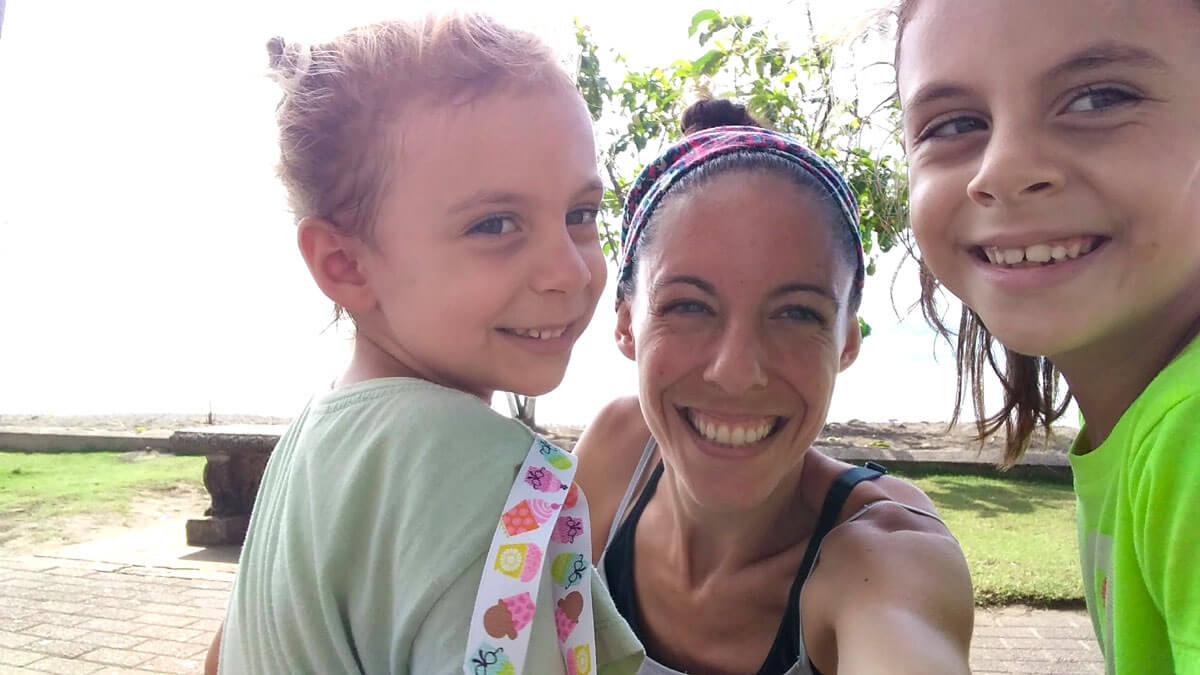
After completing the Teacher Leadership program at SPU, Kimberly was looking for an avenue to explore education reform concepts that would balance academic rigor and whole-child development through the lens of culturally responsive pedagogy. Kimberly also wanted to maintain a strong connection with the classroom while simultaneously working with teachers as an instructional coach. At that time, some incredible colleagues of Kimberly were starting an equity-focused education nonprofit in Seattle, called Collective for the Revolution of Race, Equity, & Whiteness (CRREW). In its infancy, Kimberly was working with them to get things up and running, but now that she has moved out of the area, she is on the Board and volunteers to maintain their website. Kimberly is still very passionate about the work that they do and continues to support their work as much as possible.
*As a side note, CRREW is hosting an education symposium on White Privilege in May.
Kimberly realized that the position and work she was truly looking for did not yet exist in the way she was envisioning. Kimberly decided that she needed to create it and so she held that idea in mind for a while and started planning over the next few years, storing away ideas and research for "one day" when it would become reality. Kimberly stumbled upon an education community on the Pacific coast of Costa Rica that sounded like a great start, so she and her family moved there to explore what options could exist for them. According to Kimberly, it was such a fantastic case of happenstance that she met a stellar early-childhood teacher who had a similar vision and, together, they started a small community school which has now evolved into a teacher-administered community learning center. It's called Jaco Learning Center and includes accredited full-time and part-time school, after-school tutoring and academic support, teacher instructional coaching, parent workshops, and education consulting.
Consulting, in this case, means working with educators from other schools; for example, currently, they have a visiting teacher who is looking to begin something similar in a nearby town, so he has been doing instructional observations, partner-teaching, and modeling lessons in collaboration with Jaco Learning Center. This has been an incredible experience for the students and for Kimberly, but also in the development and betterment of collective teaching and school development.
Kimberly stayed connected to the SPU community as an adjunct in the Teacher Leadership program. She states that this has been an amazing experience because she has the opportunity to continue to learn from and with the teachers in the program. Between that and participating in online PLCs (to explore ideas like gradeless classrooms, multiage standards-based instruction, and curriculum development) they are always filled with new ideas to include in their team's action research and learning center development.
Kimberly always encourages visiting teachers and families to drop in and check it out or if you're ever looking for a good working-vacation spot, she hopes you'll swing by and check out Jaco Learning Center!
Looking Back: Ten Years Past SPU’s MEd in School Counseling Program
Interviews with SPU School Counseling Alumni Hanaphi Sos, Emily Combellick, and Melody Newburn
Emily Tuttle Combellick
Emily was born and raised in the Pacific Northwest and decided to attend Willamette University for undergrad. She started as a psychology major but changed her major to English. The education classes Emily took in her senior year gave her the opportunity to volunteer at local schools. Ever since high school, Emily knew that she wanted to be a school counselor. Emily knew that she didn’t have the patience required to be a teacher, but she always wanted to work in education. Emily enjoyed listening to others and helping them through difficult times — and she loved the idea of working with middle or high school students and helping them through their formative years. After earning her bachelor’s degree, Emily moved back home and, after a short break from school, began applying to MEd programs in the Seattle area. After a very fun and interactive interview, it was an easy choice for her to begin her graduate studies at SPU!
After graduating, Emily moved home and worked for a local private high school, where she started as the front desk receptionist and eventually moved to be the receptionist in the Counseling Office while she was in her master’s program. The program at SPU was flexible, with people working full time, and her employer was very supportive of Emily going back to school. During the 2009–10 school year, Emily began her internship at Madison Middle School in West Seattle, which was a great experience for her because she already had experience at the high school level. In June 2010, Emily graduated from SPU with her MEd in school counseling. It was a pretty tough job market then, and she was lucky to find a job when so many in her program could not.
Emily’s first job out of SPU was a part-time school counselor for the Northshore School District split between two buildings: Inglemoor High School and Timbercrest Junior High. She enjoyed this experience and it was a good way to ease into working in the field. In October of 2011, Emily saw a posting for a full-time school counselor at Issaquah High School, so she decided to go for it. Emily got the job and has been there ever since. She is now the most senior counselor in her building and is serving as department chair. In December 2017, Emily became nationally board certified, and in April of 2018 she got married. A lot has happened over the past 10 years!
SPU provided Emily with the most outstanding professors, experiences, and education for the school counseling profession. She is thankful every day for the friendships that she made, and the things she learned both in and out of the classroom from her classmates. SPU prepared Emily really well for the job and for the life of a school counselor. She absolutely loves her job and will forever be grateful for the path that SPU laid out for her.
Emily: “I honestly cannot believe that this time 10 years ago I was furiously looking for an internship in preparation of starting the final year of my master’s program at SPU. Time sure flies when you’re having fun!”
Hanaphi Sos
Hanaphi grew up in Philadelphia and graduated from West Chester University with a degree in psychology. After graduation, Hanaphi moved out to the Seattle area and met his wife. He now has two amazing daughters since graduating from the School Counseling program at SPU in 2010. As an immigrant’s child, Hanaphi was the first person in his family to graduate from college and get into the education field as a career.
Before the school counseling program, Hanaphi was working in the nonprofit sector and helping adults and teens transitioning from homelessness and mental health facilities. As a case manager, Hanaphi was seeing a wide range of challenges and issues. Hanaphi has also worked with juvenile sex offenders and helping children in residential facilities for mental health concerns. He was interested in helping youth with a wide range of issues, but preferred this in an educational setting. This ultimately led him to school counseling. It had the mental health side as well as the developmental and educational component that he wanted in a career.
According to Hanaphi, SPU has definitely shaped the way he is as a school counselor and how he approaches his students every day. He felt that the program was a good fit for him both personally and professionally. The choice to go into the school counseling program has helped make his career fulfilling and the right choice. When looking back 10 years ago when he was still in the program, Hanaphi remembers the themes were used and that he is still using to this day. From taking a systems approach, to looking with a multicultural lens, and supporting students in their challenges as well as their strengths.
Hanaphi states that SPU made him a well-rounded school counselor. Being in the field for a while now (decade flew by!), he can see the difference among counselors from SPU. The training he received helped him be ready for any situation in his day-to-day work. He has never felt that he wasn't ready for any issue and he has had many challenging times in his career while working with students and their families. Hanaphi believes that his time at SPU helped develop him as a person because of the ability to self-reflect and being able to use that reflection to help students. It's not just a career but something that has been fulfilling for him. As he states, “As crazy as it can get sometimes, being able to work with students keeps me coming back for more. One of the best feelings is when your old students come back and they tell you they're doing well. This last decade has been well worth it!”
Melody Newburn
Melody Newburn attended Seattle Pacific University for her undergraduate degrees (bachelor of art in Christian theology and Christian education with a minor in Christian scriptures in 2004), as well as her master of education in schoolcounseling in 2010. Little did she know the path that her life would take following earning her master’s, or how few people in the world have the privilege of getting even a secondary level education.
Melody enjoyed working as a secondary school counselor, and college and career counselor, at Seattle Christian Schools from 2010 to 2015. She saw school counseling as her lifelong career and jumped in deep. Melody was proud to be awarded School Counseling Graduate of the Year from the SPU School of Education in 2011. She volunteered in several positions with the Washington School Counselor Association (WSCA), including SPU student liaison, conference committee co-chair, chair, and volunteer coordinator for the American School Counselor Association's (ASCA) National Conference. Melody loved partnering with students, caregivers, the school, and local community to support the social, academic, and career development of the students. The work related deeply to Melody’s belief that every person is made in the image of God and therefore has inherent dignity, value, and worth.
But life is full of twists and turns, some immediately beautiful, and some that take us time and the help of the Holy Spirit to see the hidden beauty within. Melody’s health changed drastically three years into her profession as a school counselor. In 2018, Melody was awarded “disability” for multiple chronic invisible illnesses. It has only been in the last year that she has found a treatment to help her work formally again. Melody said she felt lost, being unable to formally work. How could God use her vocationally when she was largely bed bound? Would she be able to find an occupation that felt as meaningful again? Where to find her value now as one fully dependent on others but so used to serving others? As Melody’s health kept her isolated at home, she finally jumped on the social media bandwagon. This became a deep place of connection and expression for her.
Melody found that underlying all of her SPU degrees was the core of who God created her to be and a big part of her vocation: encouraging others, sitting with others in their seasons and places of hardship, connecting with people and connecting people with others, and facilitating meaningful conversations. Melody used to be an avid backpacker and scuba diver but has now learned to find joy in slower paced things like knitting, sewing, and handcrafting. This led her to engage in social media conversations around the topic of #slowfashion and issues like conscious consumerism, spending with purpose, and ever deeper into all sorts of matters of equity and justice.
In July of 2019, Melody started formal work again in a new field: for Sseko Designs as an Independent Sseko Fellow. Sseko is a for-profit ethical fashion company that believes every woman is bright, brave, and has the potential to be a co-creator of a more just and vibrant world. From fellows like Melody in the U.S., to artisan partners and co-workers in Uganda, Ethiopia, Kenya, and India, they are engaged in an interdependent relationship to make and sell beautiful, long-lasting, body inclusive products that have equally beautiful stories, including connecting consumers with the name, picture, and story of the women — their global sisters — who make each piece of Sseko they buy. Sseko is about connecting women through fashion and fair-trade-related conversation. Naturally, this feels different from her work as a professional school counselor, but it’s meaningful nonetheless. As a school counselor, Melody believed that every student should have equal access to education and post-high school education and employment opportunities. Melody shares that very same conviction and passion as a driving force for her work with Sseko.
Whatever circumstances life brings your way, learning and education are worth the time and investment. If Melody had known that she would become disabled and unable to work in her direct profession, she would still have studied to become a school counselor. Melody states that it has made her a better parent, a better support group leader to other foster and adoptive parents, a more thoughtful listener and bridge builder during this period of divisive national discourse, and it has given her the soft and the hard skills which benefit the work she does today. Melody shares about her personal life, including being a disabled mama, on Instagram at @colibri_homestead.
Fritzberg is changing his leadership role with University Tutors for Seattle Schools
Dr. Greg Fritzberg is stepping back from a leadership role with the University Tutors for Seattle Schools (UTSS). While Fritzberg will continue to assist UTSS with payroll and tutor recruiting, he will turn his focus to a book project on Christian Education over these next few years. He has been in a non-executive, supporting role since 2017.
UTSS has had some wonderful successes over the years. This spring, UTSS is completing a seven-year City of Seattle levy/Seattle Public Schools funding cycle, 2012-2019. UTSS will continue into the new levy cycle with contracts through 2020 of hundreds of thousands of dollars. Specific amounts have yet to be finalized.
UTSS has served 30 Seattle schools with contacts totaling approximately $3.8 million from city and district funding thus far. Out of over 60 nonprofit organizations seeking levy support in 2012, UTSS became one of three programs, (with AmeriCorps and Seattle Parks & Rec), to grow large enough to require annual, direct school board funding authorization. UTSS has employed over 450 graduate, undergraduate, and “gap year” tutors across Seattle’s three universities (University of Washington, Seattle University, and Seattle Pacific University), with a slight majority of tutors from SPU. UTSS is heading into next year with an executive director, training director, a hiring associate, and a seven-member board of directors continuing to serve.
News & events
Bringing culturally responsive bullying prevention research to elementary schools
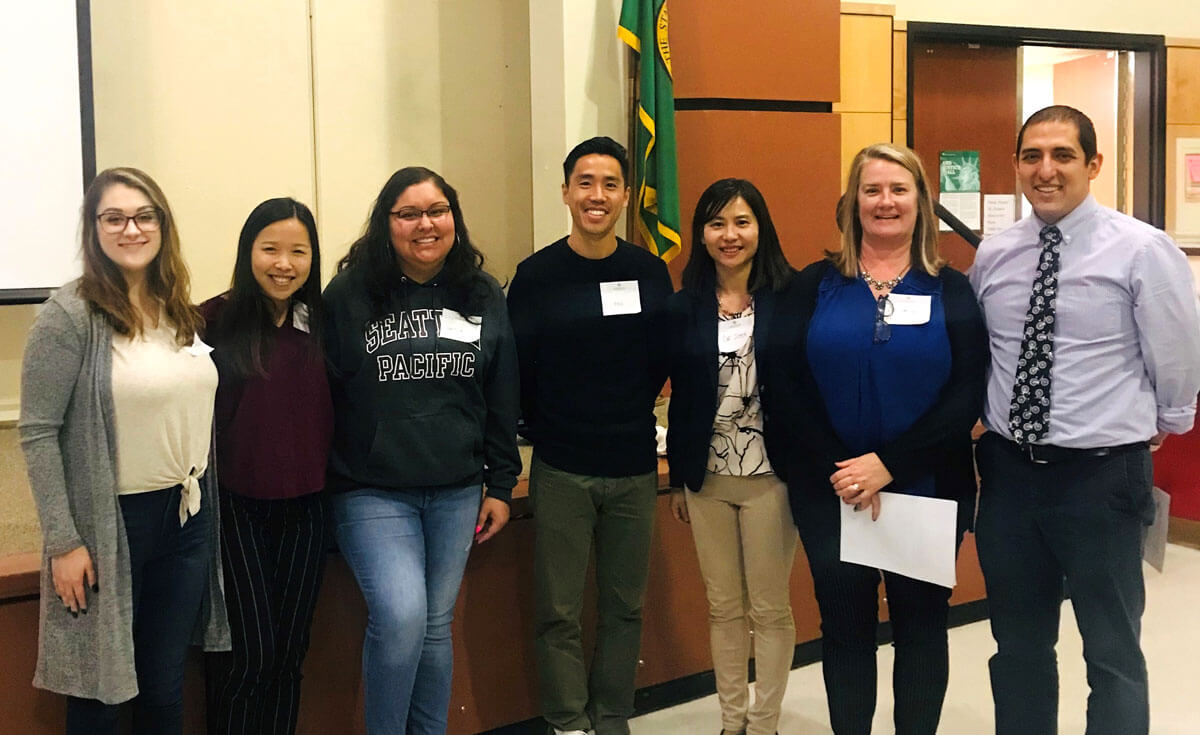
In February 2019, a team of SOE faculty – Munyi Shea, associate professor of counselor education; Jill Heiney-Smith, assistant professor and director of eeacher Education; and June Hyun, associate professor and chair of School Counseling program, were awarded the Scholarship Dissemination Grant from the School of Education to provide a series of professional development workshops on bullying prevention.
Dr. Shea, the project lead, described the purpose of the project as twofold: “Our primary goal is to promote community awareness of the unique risks and vulnerability among ethnic minority children or children of immigrants to experiencing school bullying. Another equally important goal is to bring together parents, practitioners (e.g., teachers, school counselors), administrators, and researchers to work together and discuss culturally appropriate strategies to reinforce a safe learning environment that would support students’ social-emotional growth.”
The contents of the workshop are based on published research by Dr. Shea and her colleagues on Asian and Latinx immigrant parents in Los Angeles, where they find that parents’ beliefs and attitudes toward bullying influence their responses, which in turn influence the likelihood of their children/students’ involvement in bullying and the severity of consequences. Moreover, immigrant families face additional parenting challenges in the bi-cultural context, such as language barriers, value differences, and unfamiliarity with the U.S. education system, which may affect parents’ ability to engage in various aspects of their children’s schooling, including their peer relationships and bullying involvement.
On April 2, the team delivered their first workshop in Cedarhurst Elementary School — a school with close to 50% Latinx student population — in Burien, Washington. Over 40 parents, the school principal, the school counselor, and several teachers attended the workshop. During the workshop, SPU school counseling students (Kaila, Lianna, Phil, and Vanessa) led spirited discussions with parents, teachers, administrators on various bullying and peer victimization scenarios, and explored how caregivers could best respond to these scenarios. Drs. Shea and Heiney-Smith then gave a presentation on how to recognize bullying, as well as teachers, administrators and school counselors’ role in bullying prevention. The second workshop is anticipated to take place in late May on SPU campus, where the dialogue about bullying prevention — including cyber bullying prevention — and parent-child engagement will continue.
Wicks receives International Recognition Award for ‘Making It Happen’ in educational technology
By Bobby Myers, NCCE Marketing and Communications Director
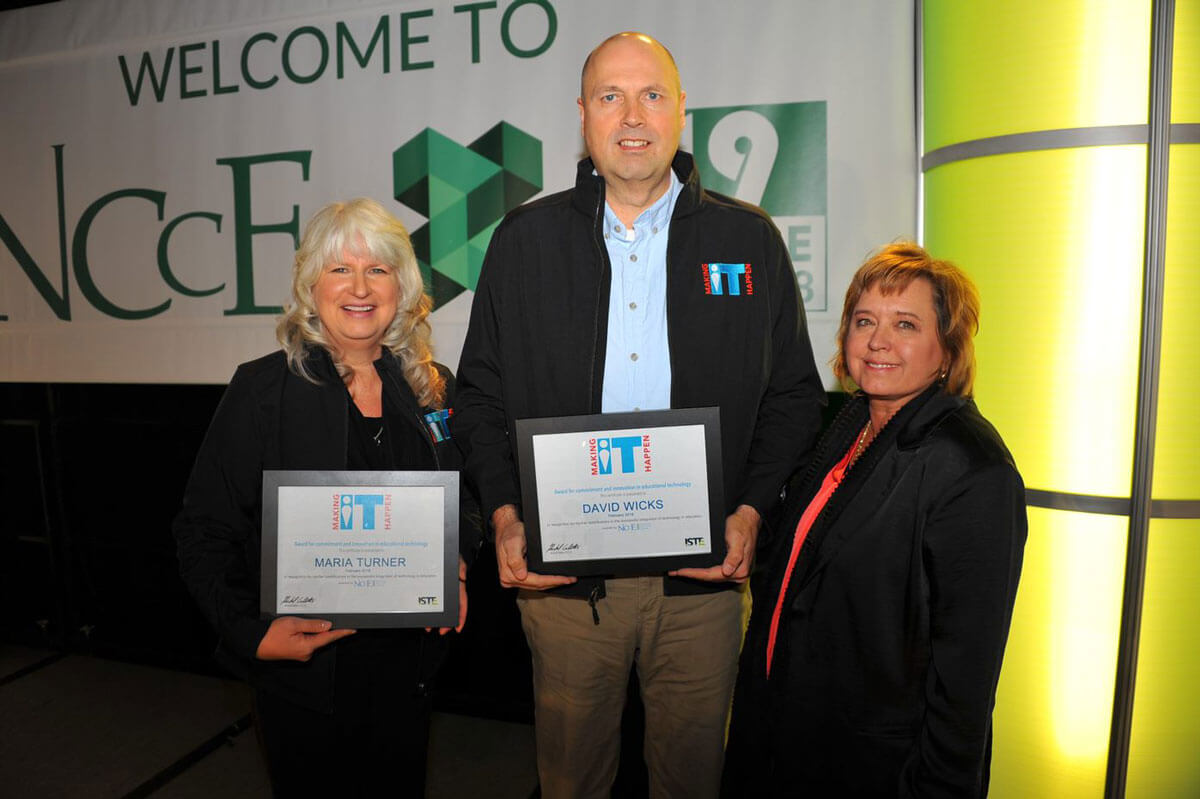
David Wicks, associate professor and chair of the Digital Education Leadership program for Seattle Pacific University’s School of Education, was recently honored with the coveted Making IT Happen jacket for demonstrating extraordinary commitment, leadership, courage, and persistence in improving digital learning opportunities for students. The Making IT Happen award is provided by the International Society for Technology in Education, ISTE, of which Northwest Council for Computer Education (NCCE), a not-for-profit professional development organization, is an affiliate.
While attending the 48th annual NCCE 2019 conference in Seattle, Dr. Wicks was honored for his dedication to education and successful integration of technology in the classroom. The Making IT Happen program has made a commitment to work with state and national organizations to identify individuals who are truly Making IT Happen within their respective state or region and to recognize them publicly.
NCCE CEO Heidi Rogers explained that the Making IT Happen program recognizes and honors those visionaries, like Wicks, who often are the unsung heroes of education. “David has made such an impact while he has been on our board of directors. We are fortunate for his input and his perception on how technology education is trending in higher education and globally,” said Dr. Rogers.
Dr. Lori Curtis receives 2019 NCCE Outstanding Technology Leader Award
By: Bobby Myers, NCCE Marketing and Communications Director
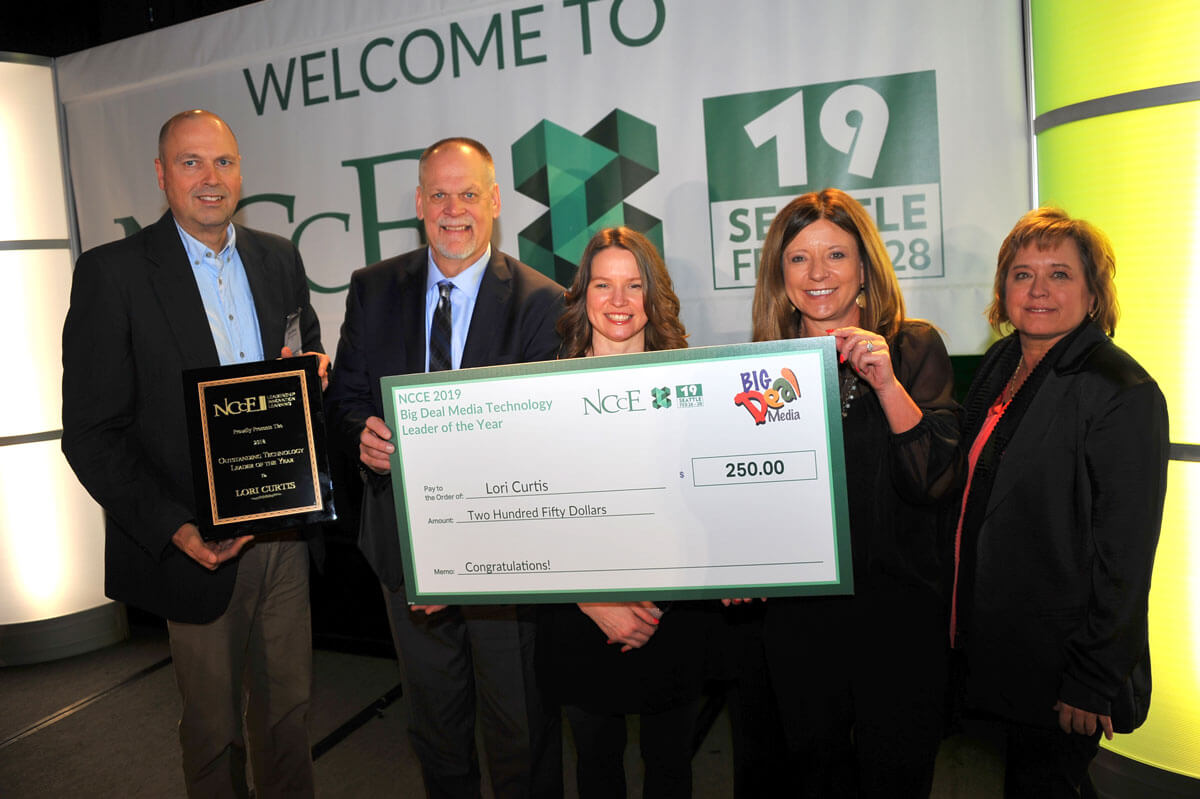
Lori Curtis, director of Digital Learning Services for White River School District, was recently honored with the NCCE 2019 Outstanding Technology Leader of the Year Award. The award is provided by Northwest Council for Computer Education (NCCE), a national educational technology professional development organization and Big Deal Media. At the closing keynote session on Thursday, February 28, Lori was presented with a $250 check from Big Deal Media for her influential 19-year career as a teacher, curriculum integration specialist, technology learning specialist, and administrator.
While attending the largest educational technology conference in Seattle, Curtis was honored for being an exceptional leader and passionate educator who keenly sees the playing field and goes beyond simply getting students and teachers to use technology.
“Lori Curtis is relentless and graceful when it comes to implementing best practice to improve adult and student learning with technology and technology integration. She’s improved the technology skill level of every single adult in the White River School District. She can be credited for inspiring educators at the local, state and national level,” stated Janel Keating-Hambly, superintendent.
NCCE CEO Heidi Rogers stated that Curtis represents the exceptional leaders in the Northwest who play such a critical role in creating opportunities for others. “Lori gets more accomplished in 24 hours than anybody I know and her strength in building relationships makes her an exceptional leader and role model,” stated Dr. Rogers. “She exemplifies the goals of NCCE and represents an extremely worthy recipient of being named the Outstanding Technology Leader of the Year in the Northwest.”
White River Schools Deputy Superintendent, Mike Hagadone, added, “Lori is a highly respected leader in our district. She has not only improved the technology infrastructure for White River, she has had a significant impact on learning.”
Behavior Management course field trip to EEU at Haring Center
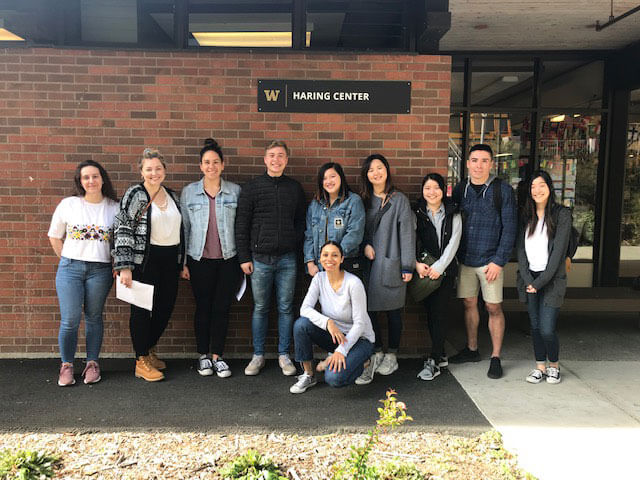
The Experimental Education Unit (EEU) at the University of Washington is a place that emphasizes inclusion for all children. The classrooms include children with all levels of ability and still provide a fun learning environment. Dr. Krystle Jalalian-Chursky’s Behavior Management class went to visit the EEU and see where her students would be working during their Capstone course.
While there, students got a chance to observe and interact with the pre-school and kindergarten-aged children, as well as their applied behavioral analysis (ABA) teachers. The students got to witness firsthand the strategies that they’ve been discussing in classes quarter after quarter, and it was a wonderful way to consolidate and understand the real-life applicability of the information that they learned during their time in the classroom.
Said special education major Kate Moreton, “It is always a bit shocking to see the level of help that some children need, and it’s definitely a topic that needs to be normalized. We have children that, for whatever reason, simply need to be taught behaviors that we would generally consider inherent. This does not mean these children lack the desire or motivation to achieve; they lack the skills. These programs help children feel confident and comfortable in a society that often ostracizes them, and that is a gift that any facility should feel honored to give. I am very excited to work with these incredible teachers and help these kids increase their self-esteem and independence.”
Said special education major Karen Okada, “I enjoyed observing ABA in practice because this experience helped give me a better idea of what ABA could look like when applied in a classroom. Rather than occur in a vacuum, students’ behaviors are influenced by a multitude of factors. In this instance, the instructor saw that this created an opportunity to reinforce multiple positive behaviors and reacted in a flexible manner in order to deal with the impact of the environmental stimuli. Hopefully, repeated experiences like these will help to expose me to different situations that may arise within my teaching career and enable me to respond in a similarly productive manner as the instructor I observed.”
The 45th Association for Moral Education Conference
A call for submissions is open for the 45th AME Conference, held on November 7–9, 2019, at Hotel Motif in Seattle. The conference features multidisciplinary research and practice that address complex issues of moral development, moral psychology, moral philosophy, and moral education through the conference theme, Morality and Ethics for the Digital World. Work in areas concerning moral education, psychology, philosophy, and moral development, along with computer ethics, science and technology studies, cultural and media studies, IT assessment, are welcomed. Learn more here.
Faculty & Staff Events
Monday, April 15
Education Job Fair
Wednesday, April 17
“Take a Break” Pop-up Event
Saturday, April 27
2019 Education and Leadership Luncheon
Friday, May 3
SOE Celebration of Service (Rick Eigenbrood, Art Ellis, Bill Nagy, Bill Prenevost)
Wednesday, May 8
“Take a Break” Pop-up Event
Wednesday, May 15
Family & Community Engagement Resource Fair
Friday, June 14
SOE Year-End Party
Tuesday, June 25–Thursday, June 27
10th Biennial Symposium: Educational Innovations in Countries Around the World
Giving
Like you, we believe in our mission to engage the culture and change the world … starting in the classroom. That’s why SPU’s School of Education is always looking for new ways to help you connect with the future of education in our state and beyond. And there’s more than one way you can get involved. In fact, here are four ways to give.
On Point
Do you have news or know of any faculty, staff, or alumni that should be featured in the next issue? Contact On Point editor Stephanie Tichelaar at stephmichelle@spu.edu.